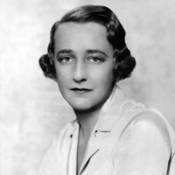
By Hal Phyfe, The Stage magazine - Public Domain
Lillian Hellman
Playwright
Biography
Lillian Hellman
Lillian Hellman was born in New Orleans in 1905. Much of her childhood was spent split between New Orleans and New York City until the early 1920s, when she attended New York University for a few years. She then transferred to Columbia University.
In 1925, Hellman married playwright Arthur Kober. However, they both traveled independently and didn't actually live together often. Hellman went to Europe in 1929, and spent time in Germany where she saw the rise of the Nazi party. While she was interested in many of the political ideas, the anti-Semitism of the Nazis impacted her; she later wrote that "for the first time in my life I thought about being a Jew.”
When Hellman returned to the states in 1930, she began working as a reader for MGM--her task was to write synopsis of popular fiction that could potentially be adapted into screenplays. While she didn't necessarily enjoy the work, it gave her a strong literary prowess. When she left MGM in 1932, Hellman returned to New York. She divorced Kober, and had a periodic relationship with writer Dashiell Hammett until his death in the 1960s.
Her time in New York City was productive. In 1934 The Children's Hour premiered on Broadway. It was wildly popular but also scandalous because of its lesbian themes (two schoolteachers are accused of a lesbian relationship by a spiteful student). When Hellman returned to MGM as a screenwriter, she revised the play into the film These Three, which took out the references to lesbianism (as it would violate film standards of the time). In 1961, however, the film adaptation, once again titled The Children's Hour and starring Audrey Hepburn, Shirley MacClaine, and James Garner, kept the lesbian themes intact. Her 1939 play The Little Foxes was just as popular (and controversial). In 1941, it was adapted for the screen, and starred Bette Davis as Regina Giddens. Tallulah Bankhead had won acclaim for the role on Broadway.
In 1935 Hellman joined the League of American Writers where she became interested in the Communist Party (several of the writers were members of the party). This association--along with others--led to accusations of communism during McCarthy's tenure, and in the 1950s Hellman was called to testify before the House Un-American Activities Committee. Famously, she talked about herself and her own experiences, but refused to testify against others, and even cited the Fifth Amendment.
Even with this controversy, Hellman remained a popular and respected writer, continuing to compose plays and films. She earned a 1960 Tony nomination for Toys in the Attic and was inducted into the American Academy of Arts and Letters in 1963. In the 1970s, she taught writing at UC Berkeley, MIT, and Hunter College. She earned honorary degrees from several other colleges and universities, including Wheaton College, Mt. Holyoke College, Yale University, and Columbia University.
Hellman died in 1984 from a heart attack at her home.
Shows
Shows associated with Lillian Hellman
Monologues
Monologues from shows associated with Lillian Hellman
Videos
Videos associated with Lillian Hellman
Quizzes
Quizzes associated with Lillian Hellman
Learning Modules
Learning modules associated with Lillian Hellman
Additional Information
N/A